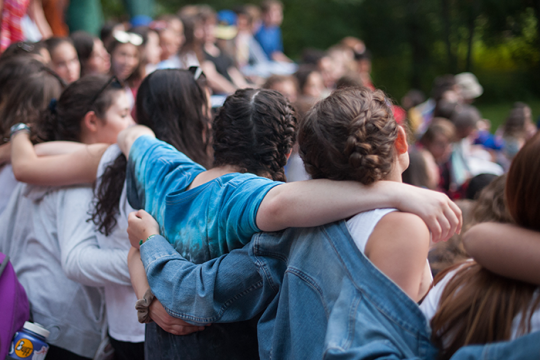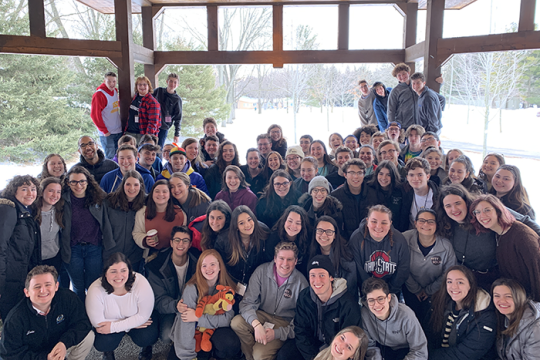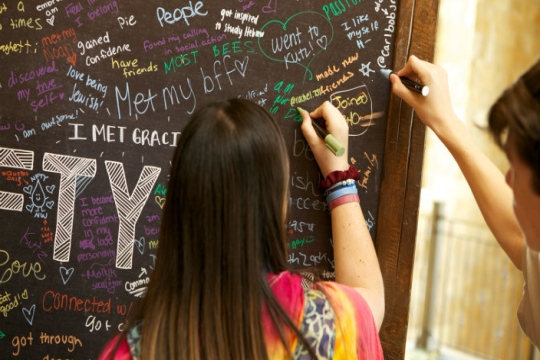By Alex Rogers, Avra Bossov, and Matt Liebman
As a central tenet of Reform Judaism, tikkun olam – repairing the world – can seem overwhelming. How does one take on such a task as an individual? For over 50 years, Mitzvah Corps has empowered Jewish teenagers across the continent to infuse this concept into their daily lives. Mitzvah Corps has impacted numerous communities and has thousands of alumni that continue the work that started during their Mitzvah Corps program.
With the Campaign for Youth Engagement’s growing focus on new entry points for teenagers to engage in Jewish life, this summer Mitzvah Corps expanded to include eight sites with over 190 participants. In other words, record levels of engagement. The beauty of Mitzvah Corps is that each summer, around the world, groups of strangers come together to build a kehilah kedosha, a holy community. We pray together, make difficult decisions together, and find the best versions of ourselves while being surrounded by bustling communities moving through their day. In essence, it brings the best of Jewish immersive experiences into the day-to-day experience of cities across the globe.
Our team spent two weeks in Portland, Oregon, with 31 incredible teens from around the country. We learned about food justice and sustainability; participated in service learning with three different community partners (PCUN, the Learning Gardens Lab, and The Rebuilding Center); and explored various neighborhoods and communities within the city. As we learned together as a new community, we watched our teens expand their view of the world, and feel empowered to apply their new knowledge immediately as they interacted with the larger Portland community.
As a 34-person community, we were able to practice tikkun olam and tikkun midot. Rabbi Jan Katzew explains these concepts best:
"The practice of tikkun olam does not stand alone. It is necessary, but not sufficient to live up to the ethics of Judaism. Some of us may be so drawn to fixing the outside world that we neglect the inner world of our being. And so Jewish tradition offers us a partner to tikkun olam, a partner that has too often been neglected -- the process of internal mending called tikkun midot. Whereas acts of tikkun olam are social and public, acts of tikkun midot are personal and private. As tikkun olam confronts the incompleteness and imperfection of the world around us, tikkun midot addresses the incompleteness and imperfection of our inner self. Tikkun midot enables us to maintain a moral balance. The term midot refers to measures -- measures which determine our character. The practice of tikkun midot is a process of defining and refining our moral compass when we are faced with competing urges and do not know which path to follow." Katzew concludes: "Tikkun midot and tikkun olam are not mutually exclusive; they are mutually dependent and inextricably intertwined; both are necessary to uplift the world. The moral whole is more than the sum of the moral parts. Spiritual awareness and social justice are two sides of the same coin: tikkun midot looks at the moral life from the inside out; tikkun olam approaches the same domain from the outside in. Tikkun midot starts with me; tikkun olam starts with us." -Repairing the World from the Inside Out, Reform Judaism, Winter 1999In addition to our work of confronting the imperfections of the world around us through understanding the broader social issue areas surrounding sustainability of communities from environmental, economic, and social lenses, we also practiced tikkun midot. We challenged ourselves to define the moral standards for our community; we defined our personal “why” statements (a concept leadership expert Simon Sinek identified in his popular TED Talk) in order to reflect externally on our behavior so that we could help each other on our journey of refining our moral compass; and we crafted what our lesson would be if we had ten minutes to teach the entire world something and how that defines who we are and the impact we wish to have. Our Mitzvah Corps Portland program formed a solid foundation of who we are as individuals and as a community and how we fit into building better communities beyond this experience—at home, in our synagogues, in our schools, in our daily interactions. As Mitzvah Corps expands, it means more teens growing, learning, laughing and being active members of society. It means more youth engaging with Jewish values. It means the harnessing of incredible energy and passion for the betterment of communities across the globe. The work of tikkun olam is not the sole responsibility of an individual, it is in the power of community paired with acts of tikkun midot, in which we can begin the most sacred task of repairing the world. Alex Rogers is the Mitzvah Corps Portland Program Director and the Youth Engagement Specialist at URJ Camp Newman. Avra Bossov is the Mitzvah Corps Portland Assistant Program Director. Matt Liebman is the Mitzvah Corps Portland Assistant Program Coordinator and the Youth Group Advisor at Temple Emanuel, Denver CO.
Related Posts
Image

Teen Programs in Full Swing with More on the Way!
There has been a lot happening in the teen and youth space over these past weeks, and many more opportunities are coming down the pipeline.
Image

Teens, Power, and NFTY – Growing our Reform Youth Movement
A few weeks ago, I had the joy of being at the "NFTY-GER Ball," one of the many NFTY events being run by Reform teen leaders across North America. A room full of teens gathered at Temple Sholom in Scotch Plains, NJ to dance, laugh, get to know one another, and celebrate Jewish life.
Image

A Note on Leadership from My 16-Year-Old Self
Almost exactly six years ago, I ran for NFTY-TOR regional president. I lost. And yet when I look back at my election materials in a bout of nostalgia, I stand by absolutely everything I said, now having seen how much the ideas I mentioned still influence me and the way I think about leadership, both personally and as an organizer working with NFTY and Reform Jewish teen leadership.